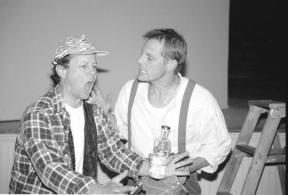One man’s midnight flight during World War II forever changes the life of another and starry nights soon lead into stormy, turbulent days in the comedic melodrama “Starry Knights,” at Bayview Hall Oct. 3, 4, 10, 11 and 12.
The play, explains “Starry Knights” co-writer and co-director Tom Churchill, begins with the story of two plain-spoken Air Force mechanics from Wisconsin. They find themselves in trouble with the military after one World War II night the poetic pilot William “Starry” Knight disappears, taking a mystery and part of a man’s mental state with him.
It’s the real, but not often talked about stories of pilots stealing planes to save marriages, pilots taking off for missions and never returning, and even Allied pilots sent to “capture Mussolini” that give Churchill’s trademark historical slant to “Starry Knights.”
“ ‘Knights’ is based on any number of real pilots who flew planes or dropped bombs during World War II,” Churchill said.
Tom Harris, from WICA’s “Who’s Afraid of Virginia Woolf?” is Herby Eckert, the loveable loose cannon of a worker. Co-director Barton Cole, from WICA’s “Telemachus Clay,” is Jimmy Haynes, Herby Eckert’s pal, boss and sometimes antagonist.
This is Cole’s first directing role, but he humbly denies the fact despite Churchill placing the two men side by side in the “directed by” slot in the program.
Harris and Cole last shared the stage in the WICA production of “Picasso at the Lapin Agile,” and both also shared the bill with their sons in the Whidbey Children’s Theater production of “Huck Finn” this spring.
The second act is a show of their acting chemistry as “Starry Knights” flashes forward to the men’s lives in the 1970s, when they are partners in a roofing and carpentry operation back home in Wisconsin, and their old troubles resurface. One of the men’s emotional balance is broken and his job and marriage are forced into limbo.
“In the beginning we see these two guys in their 20s,” Cole said. “Then the second act lunges forward 30 years and things haven’t exactly worked out the way Jimmy or Herby wanted, and it tests their friendship at times.”
“Herby’s just this damaged guy with dysfunctional relationships in his life,” Harris said. “But it’s the core of the play that manages to show the good in everyone.”
One of these relations is Herby’s college-age daughter, Joanie, played by Katrina Collins. She said Joanie caught between her love for her family and her attempt to establish who she is.
“The relationship between Joanie and her father can be painful at times and yet heartwarming at others,” she said.
And Herby’s wife, Doris, played by Julie O’Brien, must decide if she is strong enough to stand by as Herby deteriorates.
Through it all, Herby proves hard not to love, and his supporting cast of small town Wisconsin characters adds comedic and tender loving light to the sometimes stormy “Starry Knights.”
Tom Churchill gives drunken delight to Mushy, the ex-farmer and factory worker. Dwight Zehm handles dual roles as Ralph Eliot, the Perry Como singing bartender, and mad Major Cam Dudley. Loren Churchill strolls into the town bar as Jimmy’s biker son, Big John Haynes, and Joni Takanikos is the World War II nurse who attempts to be the light that helps lift Herby.
“Starry Knights” is written by Churchill and California-based writer Shawn Quirk, a former student of Churchill’s while he was a professor at University of Wisconsin at Green Bay.
It has taken the last four years to bring “Starry Knights” to life on stage. During that time, the Whidbey-based Churchill and the Fullerton, Calif.,-based Quirk heavily reworked the script through workshops, e-mails, telephone calls, more workshops, and numerous stage readings, rewrites and flip-flops of the script back and forth between the two before preliminary rehearsals began in January.
“I’ve really thrown myself into this play because it’s such a great piece of writing,” Churchill said.
In the classroom 30 years ago, he first heard the stories that lead to “Starry Knights,” and it was the quality of the story that made Churchill pay attention.
“There was an authenticity and quality to the writing. It had obviously been lived by someone and reinvented in this young man’s head,” he said. “He was one of those rare creative writing majors who write stories based upon characters — some of them so far removed from him in age, makeup and locale — and not from the usual source of self, home, and one’s emotional backyard.”
His inspiration — real life stories of pilots — is why Quirk is dedicating the play to his father, William M. Quirk, and the fellow men and women of the 342nd Bomb group, 97th squadron, 15th Air Force in Foggia, Italy, during World War II.


